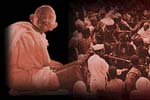Hey! Ram (NR)

synopsis
Saket Ram and his close associate and friend Amjad Ali Khan are archaeologists working under Mortimer Wheeler at the excavation sites of Mohanjodaro. Mohanjodaro the Indus Valley Civilization - born much before Ram, Christ, Prophet Mohammed and other favorite modern gods - seems the most likely place to discuss the absurdity of modern history's biggest political divorce...the creation of an neo-Islamic state - Pakistan. Saket Ram and Amjad do not see the need for such a division of India Gandhiji never did like this division to accommodate an Islamic state. He wanted to accommodate all within one country as brothers and equals. Patel and Rajaji were of the opinion that it would be better to let the two communities, Hindus and Muslims, live apart in peace. Even before Patel, Rajaji and other wise men could come to a decision, the pedestrian religious fanatics had decided to fight it out directly.... It was almost a civil war. Calcutta becomes an altar of human sacrifice for both Hindus and Muslims. It was 1946....The day announced as the Direct Action Day by Muhammad Ali Jinnah, was cruelly executed in Calcutta by its then Premier Shaheed Suhrawardy. Saket, then living in Calcutta, is drenched in this religious insanity; Saket has already come a long way from home....the Calcutta riots make him loose his way further. He tries to find his way back to a place called home.... The directions and addresses given to him are right. He even seems to know the people but finding that elusive place called home...seems impossible. A second marriage... this time arranged by concerned elders, also fails to help him settle down. He blames his recluse state on the statesmen who made hurried decisions on his country's behalf. His strong criticism finds company in those who believe likewise. While Gandhiji's philosophy of Ahimsa was slowly but steadily engaging the attention of the whole world.....Saket joins his bitter critics.... Life and truth seem to be poles apart for Saket Ram.... he is torn between his conscience and his commitment. In pursuit of an answer and a remedy to his mental dilemma, Saket Ram, on January 30th 1948, sees the triumph of human spirit over violence. He witnesses a different kind of crucifixion, which changes him for life.
details
Drama
Opened February 18th, 2000

To get the full Quicklook Films experience, uncheck "Enable on this Site" from Adblock Plus
synopsis
Saket Ram and his close associate and friend Amjad Ali Khan are archaeologists working under Mortimer Wheeler at the excavation sites of Mohanjodaro. Mohanjodaro the Indus Valley Civilization - born much before Ram, Christ, Prophet Mohammed and other favorite modern gods - seems the most likely place to discuss the absurdity of modern history's biggest political divorce...the creation of an neo-Islamic state - Pakistan. Saket Ram and Amjad do not see the need for such a division of India Gandhiji never did like this division to accommodate an Islamic state. He wanted to accommodate all within one country as brothers and equals. Patel and Rajaji were of the opinion that it would be better to let the two communities, Hindus and Muslims, live apart in peace. Even before Patel, Rajaji and other wise men could come to a decision, the pedestrian religious fanatics had decided to fight it out directly.... It was almost a civil war. Calcutta becomes an altar of human sacrifice for both Hindus and Muslims. It was 1946....The day announced as the Direct Action Day by Muhammad Ali Jinnah, was cruelly executed in Calcutta by its then Premier Shaheed Suhrawardy. Saket, then living in Calcutta, is drenched in this religious insanity; Saket has already come a long way from home....the Calcutta riots make him loose his way further. He tries to find his way back to a place called home.... The directions and addresses given to him are right. He even seems to know the people but finding that elusive place called home...seems impossible. A second marriage... this time arranged by concerned elders, also fails to help him settle down. He blames his recluse state on the statesmen who made hurried decisions on his country's behalf. His strong criticism finds company in those who believe likewise. While Gandhiji's philosophy of Ahimsa was slowly but steadily engaging the attention of the whole world.....Saket joins his bitter critics.... Life and truth seem to be poles apart for Saket Ram.... he is torn between his conscience and his commitment. In pursuit of an answer and a remedy to his mental dilemma, Saket Ram, on January 30th 1948, sees the triumph of human spirit over violence. He witnesses a different kind of crucifixion, which changes him for life.
details
Drama
Opened February 18th, 2000






